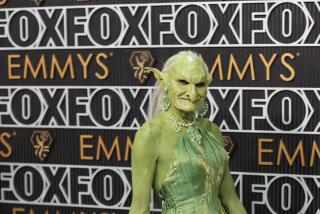Pia Toscano: Just too beautiful and talented
Oh, the outrage! Oh, the indignation! Two weeks ago, lovely Pia Toscano, over whom judge Steven Tyler had gushed that a million men in a million bars were raising their glasses to her, was voted off “American Idol” and by the public no less. The judges were stunned. Jennifer Lopez practically broke into tears. And Twitter was all atwitter with celebrities voicing their disgust at the injustice. “Who are the people who vote on American Idol?” tweeted Ashton Kutcher. “Baffled,” wrote actress Minka Kelly. “I may be done for the season,” groused the normally unflappable Tom Hanks.
The postmortem consensus was that Pia’s ouster was some sort of bizarre aberration that one could attribute either to the overconfidence of her fans who were so certain she would win that they didn’t bother to vote or to vengeful teenage girls who so resented Pia’s beauty and talent that they voted for her competitors. But the truth is probably much simpler. What the disgruntled celebrities and even the show’s own judges didn’t seem to realize is that “American Idol” isn’t about rewarding beautiful and talented people like Pia Toscano who would likely make it in show business anyway. It is about rewarding talented people who would never make it in show business if the army of viewers didn’t give them the chance. In short, “American Idol” is about public empowerment.
“Idol” is often compared to forerunners “Major Bowes Amateur Hour,” “Ted Mack’s Original Amateur Hour” or “Arthur Godfrey’s Talent Scouts” — shows that anointed winners based on audience applause. But the comparison is not entirely apt because “Idol” operates in a very different entertainment environment, and the changed environment is probably what makes “Idol” so colossally popular.
To begin with, there is much more at stake now for the contestants culturally and financially. Culturally speaking, today being a star is not just something, it is everything: a sanctification of life. Financially speaking, an “Idol” win means a crack at millions of dollars. Bowes’ winners got the chance to appear on Bowes’ traveling stage show, and winners on Mack and Godfrey got nothing but visibility. And even though a few contestants, including Frank Sinatra, who originally appeared on Bowes’ show with the Hoboken Four, and Pat Boone, who appeared on Mack’s, went on to huge careers, it wasn’t necessarily because of the programs. An “Idol” winner, even a finalist, on the other hand, becomes a household name — at least for a while.
And that matters because show business generally is much more difficult to crash than in the days of Mack and Godfrey. Nowadays one has no chance of succeeding unless he or she has something distinctive, a gimmick, and unless he or she has striking looks. There was a time when a frumpy housewife like Roberta Sherwood or a perky girl-next-door like Teresa Brewer or a chunky teen like Brenda Lee or a jowly crooner like Vaughn Monroe could make it by dint of talent alone. Those times are long gone.
Or, more accurately, they are gone everywhere but on “American Idol.” From the very beginning, when zaftig plain-faced Kelly Clarkson deservedly won with her booming pipes, the basic dynamic behind “Idol” was that the audience, exercising its franchise, wouldn’t vote for the typically handsome or beautiful svelte belter who already dominated the recording industry. They would use that franchise to send a message to the entertainment industry and to flex their own democratic muscle. They would take the fat (Ruben Studdard), the downtrodden (Fantasia Barrino), the gay (Clay Aiken and Adam Lambert), the gray (Taylor Hicks), the ill (Crystal Bowersox), the aimless (Lee DeWyze), and hand them the chance that record executives wouldn’t give them. In short, what makes “Idol” American is that it is America’s chance to run show business and then to see the results.
So “Idol” was the one place in show business where the conventional entertainer was actually at a disadvantage. Among the winners, the only one who was a pretty good bet to make it without the show was Carrie Underwood, and even Carrie Underwood on “Idol” didn’t look much like the glamorous Carrie Underwood of today. She was a girl on the verge of beautiful. The audience nudged her over.
That said, there is nevertheless some irony in the “Idol” enterprise. Even as the viewers are taking their revenge on the entertainment industry, they have been less than eager to vindicate their own choices. Clarkson, arguably the most talented “Idol” winner, had to scale back a concert tour because of lagging ticket sales, and though many winners have enjoyed success, none of them, save Underwood again, have been able to parlay their victory into genuine superstardom. From which one could conclude that even though the audience may like the idea of taking it to the entertainment industry by rewarding the unconventional, when it comes to their own entertainment, they prefer conventionally beautiful and handsome warblers to the oddities they themselves chose. It’s another example of not wanting to be member of any club that would have you.
But that doesn’t change that the overwhelming popularity of “American Idol” may be more a function of the power it enables its audience to brandish than of the entertainment value the show provides, which is to say it is more a celebration of the viewers than of the contestants. At a time when Americans increasingly feel insecure and powerless, they always win on “Idol,” and Pia Toscano’s exit is testimony to just how untrammeled their governance is.
That may make “American Idol” the entertainment equivalent of the “tea party” movement. Tea partiers incensed at Washington not just because they hate the very idea of government; they hate government largely because they believe government doesn’t listen to them – that public officials always act as if they know best. Similarly, people resent the entertainment industry not because they hate the movies, records, and TV shows it produces, which are, in fact, popular; they hate the industry because, in its arrogance, it seems as if it is superior to the public it serves. We have been its passive receptors, not the initiators. “American Idol” briefly changes that balance of power.
So let the judges and the celebrities howl. In doing so, they demonstrate that they don’t have the slightest idea of what makes “American Idol” tick, and they underscore the yawning gap between themselves — beautiful, powerful and successful — and their audience. To answer Ashton Kutcher’s question of who votes for “American Idol” — tens of millions of ordinary Americans who are demanding their voices be heard and the entertainment industry be damned.
More to Read
The biggest entertainment stories
Get our big stories about Hollywood, film, television, music, arts, culture and more right in your inbox as soon as they publish.
You may occasionally receive promotional content from the Los Angeles Times.






